
 |
|
Happy Endings (2005) Cast: Lisa Kudrow, Steve Coogan, Jesse Bradford, Jason Ritter, Maggie Gyllenhaal, Tom Arnold, Bobby Cannavale, David Sutcliffe, Laura Dern, Sarah Clarke, Hallee Hirsch, Eric Jungmann, Amanda Foreman, Johnny Galecki, Ramon De Ocampo, A.J. Trauth 2005 – 128 minutes Rated: Reviewed by Dustin Putman, July 16, 2005.  "Happy Endings," the tellingly-titled third film from writer-director Don Roos (2000's "Bounce"), could almost be a companion piece to his debut 1998 art-house hit "The Opposite of Sex." While struck in a more consistent low key—but still featuring its own brand of darkly comedic flourishes—both films deal in unforced, at times achingly real, ways with the struggle we as human beings go through to find happiness in our lives. Roos gives unexpectedly powerful resonance to this theme gradually and with noted subtlety by the faultlessly tender final scenes. This comes as a shock because, taken character-to-character and storyline-to-storyline, the picture seems while it plays itself out that it isn't really adding up to a whole lot. As an ensemble Altmanesque journey interweaving a group of seemingly unrelated people living in the Los Angeles area, "Happy Endings" is a rather minor effort, interesting without being particularly involving (especially held up next to pinnacles of the genre, like 1975's "Nashville," 1993's "Short Cuts" and 1999's "Magnolia"). But then, slowly but surely, the force of the splendid performances take hold and, along with Roos' easeful, non-showy cinematic handle, buoy the film above its more wobbly moments of indifference.
"Happy Endings," the tellingly-titled third film from writer-director Don Roos (2000's "Bounce"), could almost be a companion piece to his debut 1998 art-house hit "The Opposite of Sex." While struck in a more consistent low key—but still featuring its own brand of darkly comedic flourishes—both films deal in unforced, at times achingly real, ways with the struggle we as human beings go through to find happiness in our lives. Roos gives unexpectedly powerful resonance to this theme gradually and with noted subtlety by the faultlessly tender final scenes. This comes as a shock because, taken character-to-character and storyline-to-storyline, the picture seems while it plays itself out that it isn't really adding up to a whole lot. As an ensemble Altmanesque journey interweaving a group of seemingly unrelated people living in the Los Angeles area, "Happy Endings" is a rather minor effort, interesting without being particularly involving (especially held up next to pinnacles of the genre, like 1975's "Nashville," 1993's "Short Cuts" and 1999's "Magnolia"). But then, slowly but surely, the force of the splendid performances take hold and, along with Roos' easeful, non-showy cinematic handle, buoy the film above its more wobbly moments of indifference.
 Eighteen years after secretly giving up her baby for adoption—at the time, the father was her new stepbrother and they were both still just teenagers—abortion counselor Mamie (Lisa Kudrow) is now in her mid-30's, has a handsome masseuse boyfriend named Javier (Bobby Cannavale), and doesn't want to admit the growing void she senses in her life. This sinking feeling only reaffirms itself with the appearance of shady film student Nicky (Jesse Bradford), who claims to know where Mamie's child is and wants to create a documentary centering around a reunion. When she shows reluctance, he turns to blackmail, leading to a whole different film—fabricated by Mamie and Javier and unbeknownst to Nicky—centering around the "happy endings" masseuse Javier gives his clients.
Eighteen years after secretly giving up her baby for adoption—at the time, the father was her new stepbrother and they were both still just teenagers—abortion counselor Mamie (Lisa Kudrow) is now in her mid-30's, has a handsome masseuse boyfriend named Javier (Bobby Cannavale), and doesn't want to admit the growing void she senses in her life. This sinking feeling only reaffirms itself with the appearance of shady film student Nicky (Jesse Bradford), who claims to know where Mamie's child is and wants to create a documentary centering around a reunion. When she shows reluctance, he turns to blackmail, leading to a whole different film—fabricated by Mamie and Javier and unbeknownst to Nicky—centering around the "happy endings" masseuse Javier gives his clients.
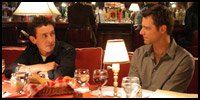 Before long, other characters, many only indirectly connected to Mamie, enter the frames. Mamie's stepbrother, Charley (Steve Coogan) begins to notice that the baby of lesbian friends Pam (Laura Dern) and Diane (Sarah Clarke) bears a striking resemblance to his long-time architect boyfriend Gil (David Sutcliffe). Gil, who was a sperm donor several years before, can't believe such a thing, but Charley is adamant, willing to do whatever necessary to get to the bottom of the matter.
Before long, other characters, many only indirectly connected to Mamie, enter the frames. Mamie's stepbrother, Charley (Steve Coogan) begins to notice that the baby of lesbian friends Pam (Laura Dern) and Diane (Sarah Clarke) bears a striking resemblance to his long-time architect boyfriend Gil (David Sutcliffe). Gil, who was a sperm donor several years before, can't believe such a thing, but Charley is adamant, willing to do whatever necessary to get to the bottom of the matter.
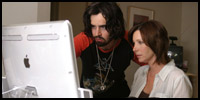 At the restaurant Charley took over from he and Mamie's deceased parents works closeted 22-year-old aspiring musician Otis (Jason Ritter). When his band's female lead singer ends up in rehab, Otis promptly replaces her with the elusive Jude (Maggie Gyllenhaal) after he hears her sing karaoke at the restaurant. Jude, a pathological liar and seductress, needs a place to stay, and sets out to first bed the gay Otis, and later, Otis' pushover father Frank (Tom Arnold). Otis desperately wants to warn his dad of Jude's intentions, but in order to do that he will have to finally come out.
At the restaurant Charley took over from he and Mamie's deceased parents works closeted 22-year-old aspiring musician Otis (Jason Ritter). When his band's female lead singer ends up in rehab, Otis promptly replaces her with the elusive Jude (Maggie Gyllenhaal) after he hears her sing karaoke at the restaurant. Jude, a pathological liar and seductress, needs a place to stay, and sets out to first bed the gay Otis, and later, Otis' pushover father Frank (Tom Arnold). Otis desperately wants to warn his dad of Jude's intentions, but in order to do that he will have to finally come out.
 Any synopsis of "Happy Endings" is bound to sound confusing and overly complicated, but it really isn't. Writer-director Don Roos segues from subplot to subplot without falling into the easy trap of becoming choppy and episodic, likely because the actors see into the souls of their characters with such clear-eyed efficiency. These performances, most notably from Lisa Kudrow (2002's "Analyze That"), Maggie Gyllenhaal (2003's "Mona Lisa Smile"), Jason Ritter (2004's "Raise Your Voice"), and a never-better Tom Arnold (2004's "Soul Plane"), are layered, understated, and uncontrollably fascinating in a way that the individual stories are not. Oh, they are fine enough, but at least one of them—the Charley/Gil/Pam/Diane sections—feels empty and one-minded as it spins its wheels around a guessing game of whether Gil is or isn't the baby's father. The other two are better, weaving a poignant spell that gets the viewer to deeply care about what happens to these people without hardly noticing, but neither keys into any much-needed urgency until the third act.
Any synopsis of "Happy Endings" is bound to sound confusing and overly complicated, but it really isn't. Writer-director Don Roos segues from subplot to subplot without falling into the easy trap of becoming choppy and episodic, likely because the actors see into the souls of their characters with such clear-eyed efficiency. These performances, most notably from Lisa Kudrow (2002's "Analyze That"), Maggie Gyllenhaal (2003's "Mona Lisa Smile"), Jason Ritter (2004's "Raise Your Voice"), and a never-better Tom Arnold (2004's "Soul Plane"), are layered, understated, and uncontrollably fascinating in a way that the individual stories are not. Oh, they are fine enough, but at least one of them—the Charley/Gil/Pam/Diane sections—feels empty and one-minded as it spins its wheels around a guessing game of whether Gil is or isn't the baby's father. The other two are better, weaving a poignant spell that gets the viewer to deeply care about what happens to these people without hardly noticing, but neither keys into any much-needed urgency until the third act.
 As the quietly regretful Mamie, Lisa Kudrow shines in a role 180 degrees from Phoebe on TV's "Friends" and her current standout role as Valerie Cherish on HBO's part-hilarious, part-heartbreaking "The Comeback." Time and again, Kudrow has proven to be an actress with range and talent far exceeding what has been seen on the small screen, and here she is again, in a role that gives her first-rate work in "The Opposite of Sex" a run for its money, essaying a funny, likable, flawed, resourceful, shattered heroine in all of her beautiful imperfections. Just as noteworthy is Maggie Gyllenhaal's rapturously portrayed Jude, who finds the humanity underneath her shadowed enigma of a character; this is all the more a triumph because she is so ruthlessly manipulative. By the end, though, and despite what are essentially gold-digging ways, you actually feel sorry for her.
As the quietly regretful Mamie, Lisa Kudrow shines in a role 180 degrees from Phoebe on TV's "Friends" and her current standout role as Valerie Cherish on HBO's part-hilarious, part-heartbreaking "The Comeback." Time and again, Kudrow has proven to be an actress with range and talent far exceeding what has been seen on the small screen, and here she is again, in a role that gives her first-rate work in "The Opposite of Sex" a run for its money, essaying a funny, likable, flawed, resourceful, shattered heroine in all of her beautiful imperfections. Just as noteworthy is Maggie Gyllenhaal's rapturously portrayed Jude, who finds the humanity underneath her shadowed enigma of a character; this is all the more a triumph because she is so ruthlessly manipulative. By the end, though, and despite what are essentially gold-digging ways, you actually feel sorry for her.
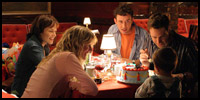 As the shielded Otis, Jason Ritter is captivating as he presents a rarity: a young man struggling to come to terms with his sexuality who is nonetheless perfectly even-headed and normal. And as Otis' father, Frank, who gets his hopes up when Jude falsely tells him Otis has a girlfriend, Tom Arnold's persona disappears completely from his first moment on the screen and all that we see is a character. Frank is vulnerable and sympathetic, if a little slow to recognize what is staring right back at him, and the way he is willing to put his only son before the chance at the kind of free, youthful woman he will never have again is fresh and inspiring in its treatment. The rest of the actors are very good too, with Jesse Bradford (2002's "Swimfan") shaggy and intense as the mysterious Nicky, but some—Laura Dern (2004's "We Don't Live Here Anymore"), Sarah Clarke (2003's "Thirteen") and David Sutcliffe (2003's "Under the Tuscan Sun"), for instance—get lost in comparatively underwritten roles within the least interesting of the three simultaneous storylines.
As the shielded Otis, Jason Ritter is captivating as he presents a rarity: a young man struggling to come to terms with his sexuality who is nonetheless perfectly even-headed and normal. And as Otis' father, Frank, who gets his hopes up when Jude falsely tells him Otis has a girlfriend, Tom Arnold's persona disappears completely from his first moment on the screen and all that we see is a character. Frank is vulnerable and sympathetic, if a little slow to recognize what is staring right back at him, and the way he is willing to put his only son before the chance at the kind of free, youthful woman he will never have again is fresh and inspiring in its treatment. The rest of the actors are very good too, with Jesse Bradford (2002's "Swimfan") shaggy and intense as the mysterious Nicky, but some—Laura Dern (2004's "We Don't Live Here Anymore"), Sarah Clarke (2003's "Thirteen") and David Sutcliffe (2003's "Under the Tuscan Sun"), for instance—get lost in comparatively underwritten roles within the least interesting of the three simultaneous storylines.
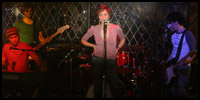 "Happy Endings" works only in fits and starts, but the scenes that lead nowhere special are worth sitting through for the other moments of exquisite honesty, wry originality, and grade-A acting. Sporadic title cards pop up to comment in hip and clever ways on the actions and mind frames of the characters, as well as to key one into their pasts and impending futures. It may sound obtrusive and obvious, but it actually works gangbusters, strengthening the film's cumulative depth with asides of human nature and from characters' most inner thoughts that ring with resounding truth. The ending, or series of endings—one per character—are not all as equally happy as the title suggests, but evolve out of the curveballs and surprises that life throws each of our ways. And the final moments, beautifully underscored to Maggie Gyllenhaal's haunting rendition of Billy Joel's "Just the Way You Are," are simple, lyrical, and stunning in their metaphorical implications.
"Happy Endings" works only in fits and starts, but the scenes that lead nowhere special are worth sitting through for the other moments of exquisite honesty, wry originality, and grade-A acting. Sporadic title cards pop up to comment in hip and clever ways on the actions and mind frames of the characters, as well as to key one into their pasts and impending futures. It may sound obtrusive and obvious, but it actually works gangbusters, strengthening the film's cumulative depth with asides of human nature and from characters' most inner thoughts that ring with resounding truth. The ending, or series of endings—one per character—are not all as equally happy as the title suggests, but evolve out of the curveballs and surprises that life throws each of our ways. And the final moments, beautifully underscored to Maggie Gyllenhaal's haunting rendition of Billy Joel's "Just the Way You Are," are simple, lyrical, and stunning in their metaphorical implications.
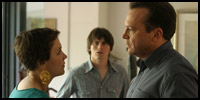 As "Happy Endings" plays out, it is easy to see how some may call it on its unevenness. While it does fall into that trap, and a particular development involving Mamie, Nicky and Javier is more contrived and muddled than it should have been, getting to the end certainly proves rewarding. The characters, and what they come to mean to the viewer, sneak up on you in a way you can't possibly anticipate, and then their impact suddenly hit you like a ton of emotional weights. "Happy Endings," like its characters, is an ambitious, if flawed, work, but there is also a touching soulful quality that cannot be denied and cannot be faked. The writer in Don Roos seems to always be willing to say the things most others would only think, and that is not seen nearly often enough among today's sad Hollywood onslaught of remakes and sequels.
As "Happy Endings" plays out, it is easy to see how some may call it on its unevenness. While it does fall into that trap, and a particular development involving Mamie, Nicky and Javier is more contrived and muddled than it should have been, getting to the end certainly proves rewarding. The characters, and what they come to mean to the viewer, sneak up on you in a way you can't possibly anticipate, and then their impact suddenly hit you like a ton of emotional weights. "Happy Endings," like its characters, is an ambitious, if flawed, work, but there is also a touching soulful quality that cannot be denied and cannot be faked. The writer in Don Roos seems to always be willing to say the things most others would only think, and that is not seen nearly often enough among today's sad Hollywood onslaught of remakes and sequels.
|
© 2008 by Dustin Putman |














